Fleurs du Mal Magazine


Or see the index
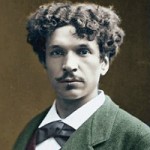
Charles Cros
(1842 – 1888)
Scherzo – Poéme
Sourires, fleurs, baisers, essences,
Après de si fades ennuis.
Après de si ternes absences.
Parfumez le vent de mes nuits!
Illuminez ma fantaisie.
Jonchez mon chemin idéal.
Et versez-moi votre ambroisie.
Longs regards, lys. lèvres, santal!
*
Car j’ignore l’amour caduque
Et le dessillement des yeux,
l’uisqu’encor sur ta blanche nuque
L’or flamboie en flocons soyeux.
Et cependant, ma fière amie.
Il y a longtemps, n’est-ce pas?
Qu’un matin tu t’es endormie,
Lassp d’amour, entre mes bras.
Ce ne sont pas choses charnelles
Qui font ton attrait non pareil.
Qui conservent à tes prunelles
Ces mêmes rayons de soleil.
Car les choses charnelles meurent.
Ou se fanent à l’air réel.
Mais toujours tes beautés demeurent
Dans leur nimbe immatériel.
*
Ce n’est plus l’heure des tendresses
Jalouses, ni des faux serments.
Ne me dis rien de mes maîtresses.
Je ne compte pas tes amants.
*
A toi. comète vagabonde
Souvent attardée en chemin.
Laissant ta chevelure blonde
Flotter dans l’éther surhumain.
Qu’importent quelques astres pâles
Au ciel troublé de ma raison.
Quand tu viens à longs intervalles
Envelopper mon horizon?
Charles Cros poetry
fleursdumal.nl magazine
More in: Archive C-D, Cros, Charles
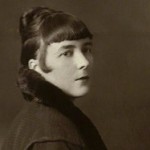
Katherine Mansfield
(1888 – 1923)
When I was a Bird
I climbed up the karaka tree
Into a nest all made of leaves
But soft as feathers.
I made up a song that went on singing all by itself
And hadn’t any words, but got sad at the end.
There were daisies in the grass under the tree.
I said just to try them:
“I’ll bite off your heads and give them to my little
children to eat.”
But they didn’t believe I was a bird;
They stayed quite open.
The sky was like a blue nest with white feathers
And the sun was the mother bird keeping it warm.
That’s what my song said: though it hadn’t any words.
Little Brother came up the patch, wheeling his barrow.
I made my dress into wings and kept very quiet.
Then when he was quite near I said: “Sweet, sweet!”
For a moment he looked quite startled;
Then he said: “Pooh, you’re not a bird; I can see
your legs.”
But the daisies didn’t really matter,
And Little Brother didn’t really matter;
I felt just like a bird.
Katherine Mansfield poetry
fleursdumal.nl magazine
More in: Archive M-N, Katherine Mansfield, Mansfield, Katherine
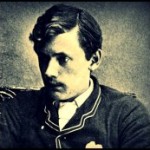
Ernest Dowson
(1867-1900)
A Last Word
Let us go hence: the night is now at hand;
The day is overworn, the birds all flown;
And we have reaped the crops the gods have sown;
Despair and death; deep darkness o’er the land,
Broods like an owl; we cannot understand
Laughter or tears, for we have only known
Surpassing vanity: vain things alone
Have driven our perverse and aimless band.
Let us go hence, somewhither strange and cold,
To Hollow Lands where just men and unjust
Find end of labour, where’s rest for the old,
Freedom to all from love and fear and lust.
Twine our torn hands! O pray the earth enfold
Our life-sick hearts and turn them into dust.
Ernest Dowson poetry
fleursdumal.nl magazine
More in: Archive C-D, Dowson, Ernest
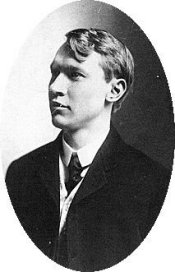
Vachel Lindsay
(1879-1931)
A Rhyme About An Electrical Advertising Sign
I look on the specious electrical light
Blatant, mechanical, crawling and white,
Wickedly red or malignantly green
Like the beads of a young Senegambian queen.
Showing, while millions of souls hurry on,
The virtues of collars, from sunset till dawn,
By dart or by tumble of whirl within whirl,
Starting new fads for the shame-weary girl,
By maggoty motions in sickening line
Proclaiming a hat or a soup or a wine,
While there far above the steep cliffs of the street
The stars sing a message elusive and sweet.
Now man cannot rest in his pleasure and toil
His clumsy contraptions of coil upon coil
Till the thing he invents, in its use and its range,
Leads on to the marvellous CHANGE BEYOND CHANGE.
Some day this old Broadway shall climb to the skies,
As a ribbon of cloud on a soul-wind shall rise.
And we shall be lifted, rejoicing by night,
Till we join with the planets who choir their delight.
The signs in the street and the signs in the skies
Shall make a new Zodiac, guiding the wise,
And Broadway make one with that marvellous stair
That is climbed by the rainbow-clad spirits of prayer.
Vachel Lindsay poetry
fleursdumal.nl magazine
More in: Archive K-L, CLASSIC POETRY, Lindsay, Vachel
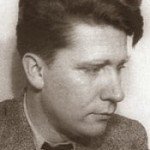
Hendrik Marsman
(1899-1940)
De vreemdeling
Laat mij alleen.
Dit is de tweesprong onzer wegen.
Gij hebt mij tot den versten rand geleid.
Maar keer hier om, ween niet.
Gij kunt den laatsten tocht naast mij niet schrijden,
noch ik met u, gij gaat hem eens alleen.
Gij zijt mij nochtans onverdeeld verpand:
Ik heb uw bloed den donkren kus gegeven
van hen, die boven dood en leven
ontstegen zijn. Ik ben hun afgezant.
Ik beid uw komst.
Wij zullen eens den zwarten wijn
van dood en donker uit één beker drinken,
wij zullen stromend in elkaar verzinken
en eeuwig zijn.
Vaarwel.
Ik keer niet weer.
Maar gij komt zelve, later.
Vaarwel, het water
roept voor de derde keer.
Hendrik Marsman poetry
fleursdumal.nl magazine
More in: Archive M-N, Marsman, Hendrik
Laat me nu zitten
Laat me een rustig gebaar
Laat me de laatste wijn
Laat me de langste slaap
Hans van de Waarsenburg (Helmond 1943 – Maastricht 2015) is op 15 juni 2015, na een kort ziekbed, overleden. Van de Waarsenburg debuteerde in 1965 met de bundel Gedichten. Hij was, behalve dichter, een zeer gewaarderd literatuurcriticus en auteur van kinderboeken. Het grootste deel van zijn werkzame leven (vanaf 1966) woonde en werkte hij in Maastricht.
Van 1995 tot 2000 was Hans van de Waarsenburg voorziter van het PEN-Centrum Nederland. Daarnaast was hij sinds 1997 medeoprichter en voorzitter van The Maastricht International Poetry Nights, een grote tweejaarlijkse internationale poëziemanifestatie.
Van Hans van de Waarsenburg zijn verschillende werken vertaald in o.a. het Duits, Engels, Spaans en enkele Slavische talen.
In november verschijnt bij Wereldbibliotheek Een rijbroek uit Canada, een kloeke bloemlezing uit het omvangrijke werk van Hans van de Waarsenburg, nog voor zijn onverwachte overlijden door de dichter zelf samengesteld. Het boek wordt geopend met een voorwoord van de auteur waarin hij zijn keuze verantwoordt, en afgesloten met een nawoord van dichter Daan Cartens.
In Memoriam Hans van de Waarsenburg (1943 – 2015)
fleursdumal.nl magazine
More in: Archive W-X, Art & Literature News, In Memoriam, Waarsenburg, Hans van de
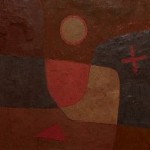
Paul Klee
(1879-1940)
In einem Zimmer gefangen…
In einem Zimmer gefangen
große Gefahr
kein Ausgang
Da: ein offenes Fenster, hinauf, abstoßen:
ich fliege frei,
aber es regnet fein,
es regnet fein,
es regnet,
regnet,
regnet…
regnet…
Paul Klee Gedicht
fleursdumal.nl magazine
More in: Archive K-L, Expressionism, Klee, Paul
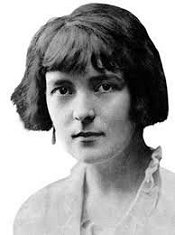
Katherine Mansfield
(1888 – 1923)
A Day in Bed
I wish I had not got a cold,
The wind is big and wild,
I wish that I was very old,
Not just a little child.
Somehow the day is very long
Just keeping here, alone;
I do not like the big wind’s song,
He’s growling for a bone
He’s like an awful dog we had
Who used to creep around
And snatch at things—he was so bad,
With just that horrid sound.
I’m sitting up and nurse has made
Me wear a woolly shawl;
I wish I was not so afraid;
It’s horrid to be small.
It really feels quite like a day
Since I have had my tea;
P’raps everybody’s gone away
And just forgotten me.
And oh! I cannot go to sleep
Although I am in bed.
The wind keeps going creepy-creep
And waiting to be fed.
Katherine Mansfield poetry
fleursdumal.nl magazine
More in: Archive M-N, Katherine Mansfield, Mansfield, Katherine
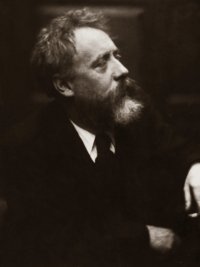
William Ernest Henley
(1849 – 1903)
Suicide
Staring corpselike at the ceiling,
See his harsh, unrazored features,
Ghastly brown against the pillow,
And his throat—so strangely bandaged!
Lack of work and lack of victuals,
A debauch of smuggled whisky,
And his children in the workhouse
Made the world so black a riddle
That he plunged for a solution;
And, although his knife was edgeless,
He was sinking fast towards one,
When they came, and found, and saved him.
Stupid now with shame and sorrow,
In the night I hear him sobbing.
But sometimes he talks a little.
He has told me all his troubles.
In his broad face, tanned and bloodless,
White and wild his eyeballs glisten;
And his smile, occult and tragic,
Yet so slavish, makes you shudder!
William Ernest Henley poetry
fleursdumal.nl magazine
More in: Archive G-H, Archive G-H, CLASSIC POETRY, Henley, William Ernest, Suicide
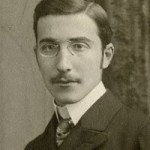
Stefan Zweig
(1881-1942)
Ahnung
Die Sonne endet ihre Reise, –
Wir wandeln unsern Park entlang.
Von ferne summt noch eine Weise …
Wir horchen hin … Und leise, leise
Zieht es uns mit in Wort und Klang,
Als wollte alles sich erfüllen,
Was in uns noch in Blüten steht. –
Wir ahnen den geheimen Willen,
Und unsre Liebe neigt die stillen
Versehnten Augen zum Gebet …
Stefan Zweig poetry
fleursdumal.nl magazine
More in: Archive Y-Z, Stefan Zweig, Zweig, Stefan
.jpg)
Nikola Vaptsarov
(1909-1942)
Song
Over Pirin
howling winds
the forests sway.
We were seven
set out to fight
far away;
very soon
we lost sight
of Pirin
and its starry night.
In the bushes
with wild beasts we slept
and across the border
we crept.
On the grass
we seemed to see stains
of our fathers’ blood
washed by the rains.
And we seemed to hear
the green leaves say
where our mothers
in the ground lay.
We knew
when we saw earth cherry-red,
that our first love
lay there dead.
Seven of us
sent away to fight.
Only three of us
came back through the night.
Nikola Vaptsarov poetry
fleursdumal.nl magazine
More in: Archive U-V, Vaptsarov, Nikola
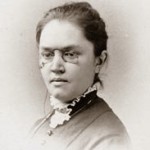
Katharine Lee Bates
(1859 – 1929)
Blood Road
The Old Year groaned as he trudged away,
His guilty shadow black on the snow,
And the heart of the glad New Year turned grey
At the road Time bade him go.
“O Gaffer Time, is it blood-road still?
Is the noontide dark as the stormy morn?
Is man’s will yet as a wild beast’s will?
When shall the Christ be born?”
He laughed as he answered, grim Gaffer Time,
Whose laugh is sadder than all men’s moan.
“That name rides high on our wrath and crime,
For the Light in darkness shone.
“And thou, fair youngling, wilt mend the tale?”
The New Year stared on the misty word,
Where at foot of a cross all lustrous pale
Men raged for their gods of gold.
“Come back, Old Year, with thy burden bent.
Come back and settle thine own dark debt.”
“Nay, let me haste where the years repent,
For I’ve seen what I would forget.”
“And I, the first of a stately train,
The tramp of a century heard behind,
Must I be fouled with thy murder-stain?
Is there no pure path to find?”
The Old Year sneered as he limped away
To the place of his penance dim and far.
The New Year stood in the gates of day,
Crowned with the morning star.
Katharine Lee Bates poetry
fleursdumal.nl magazine
More in: Archive A-B, CLASSIC POETRY
Thank you for reading Fleurs du Mal - magazine for art & literature